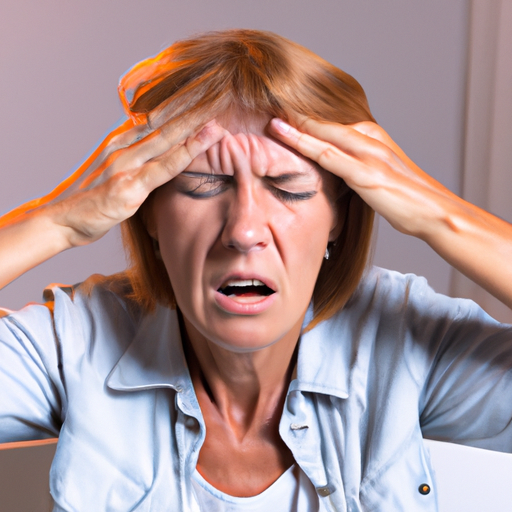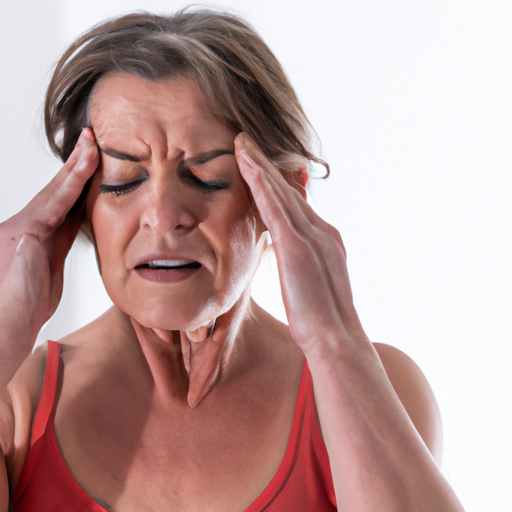Hot flashes are a common symptom experienced by many women during menopause, characterized by sudden intense heat and sweating. While they are often associated with bodily discomfort, have you ever wondered if hot flashes can also trigger headaches or migraines? This article explores the possible connection between these two symptoms, shedding light on the potential impact that hot flashes may have on your head. So, grab a cup of tea, get comfortable, and let’s delve into this topic together.

What are hot flashes?
Definition
Hot flashes are a sudden, intense feeling of heat that spreads throughout the body, typically lasting for a few minutes. They are often associated with menopause, but can occur in other situations as well, such as after surgical removal of the ovaries or as a side effect of some medications.
Causes
Hot flashes can be caused by a variety of factors, including hormonal changes, particularly a decrease in estrogen levels. Other potential causes include changes in blood vessels, changes in the hypothalamus (the part of the brain that regulates body temperature), and certain lifestyle factors such as obesity and smoking.
Symptoms
During a hot flash, you may experience a sudden feeling of intense heat, accompanied by sweating, flushing of the skin, rapid heartbeat, and a sensation of anxiety. After the flash subsides, you may feel a chill or shiver. The frequency and intensity of hot flashes can vary greatly among individuals.
What are headaches and migraines?
Definition
Headaches are a common condition characterized by pain or discomfort in the head or neck. They can range from mild to severe and can last for a few hours or even days. Migraines are a specific type of headache that is often accompanied by other symptoms such as sensitivity to light and sound, nausea, and visual disturbances.
Causes
Headaches and migraines can have various causes, including tension, stress, muscle tension, sinus congestion, and hormonal changes. Migraines are believed to be caused by a combination of genetic and environmental factors, but the exact cause is still not fully understood.
Symptoms
The symptoms of a headache can vary depending on the type and cause of the headache. Common symptoms include a dull, aching pain, pressure or tightness in the head, and tenderness in the muscles of the scalp or neck. Migraines, on the other hand, often involve throbbing or pulsating pain on one side of the head, accompanied by nausea, vomiting, and sensitivity to light and sound.
Hot flashes vs. headaches
Relationship between hot flashes and headaches
While hot flashes and headaches are two separate conditions, they can often coexist and even influence each other. Many women going through menopause experience both hot flashes and headaches, which can be attributed to the hormonal changes happening in the body. It is not uncommon for women to experience a hot flash followed by a headache or vice versa.
Frequency of headaches during hot flashes
Research has shown that women experiencing hot flashes are more likely to also experience headaches. In fact, one study found that women who reported having hot flashes were three times more likely to also have headaches compared to women who did not have hot flashes. The frequency and severity of headaches during hot flashes can vary among individuals, but the correlation between the two is worth noting.
Can hot flashes cause migraines?
Research studies on hot flashes and migraines
While the relationship between hot flashes and migraines is still being studied, there is evidence to suggest that hot flashes can indeed trigger migraines in some individuals. One study found that women experiencing hot flashes were more likely to also have migraines compared to women without hot flashes.
Hormonal changes as a triggering factor
The hormonal changes that occur during menopause, including a decrease in estrogen levels, have been linked to an increased risk of migraines. Estrogen is known to have a protective effect on the brain, and when its levels fluctuate during menopause, it can potentially trigger migraines in susceptible individuals.
Other potential causes of migraines during hot flashes
While hormonal changes are a significant contributing factor to migraines during hot flashes, other factors can also come into play. These may include changes in blood vessels, neurotransmitter imbalances, stress, and certain lifestyle factors such as lack of sleep or poor diet. Identifying and addressing these potential triggers can help in managing migraines during hot flashes.

Can hot flashes cause headaches?
Research studies on hot flashes and headaches
Several studies have investigated the relationship between hot flashes and headaches, and the results indicate that there is a link between the two. Women experiencing hot flashes have been found to have a higher prevalence of headaches compared to those without hot flashes.
Disruption of sleep as a cause
One possible explanation for the association between hot flashes and headaches is the disruption of sleep. Hot flashes can cause night sweats and discomfort, leading to interrupted sleep patterns. Lack of quality sleep has been known to trigger headaches and migraines in many individuals, so it is plausible that the sleep disturbances caused by hot flashes may contribute to the development of headaches.
Other potential causes of headaches during hot flashes
In addition to sleep disturbances, other factors may contribute to headaches during hot flashes. These may include hormonal changes, stress, dehydration, and certain medications. Identifying and addressing these potential triggers can help in preventing and managing headaches during hot flashes.
Preventing and managing hot flashes, headaches, and migraines
Lifestyle changes
Making certain lifestyle changes can help in preventing and managing both hot flashes and headaches. These may include maintaining a healthy weight, avoiding trigger foods and beverages (such as caffeine and alcohol), practicing stress reduction techniques (such as yoga or meditation), and keeping hydrated.
Hormone therapy
For women experiencing severe symptoms, hormone therapy may be recommended. Estrogen therapy can help regulate hormone levels and alleviate hot flashes, which in turn may reduce the frequency and severity of headaches and migraines. However, hormone therapy is not suitable for everyone and may have potential risks and side effects, so it is important to consult with a healthcare professional.
Stress reduction techniques
Since stress can be a triggering factor for hot flashes, headaches, and migraines, incorporating stress reduction techniques into your daily routine can be beneficial. This can include activities such as deep breathing exercises, mindfulness meditation, regular physical exercise, and engaging in hobbies or activities that bring you joy and relaxation.
Medications
There are various medications available that can help in managing both hot flashes and headaches. For hot flashes, options may include hormone replacement therapy, selective serotonin reuptake inhibitors (SSRIs), and certain blood pressure medications. For headaches and migraines, over-the-counter pain relievers, triptans, and preventive medications may be prescribed. It is important to consult with a healthcare professional to determine the most suitable medication options for your specific situation.
Seeking medical advice
Diagnosis
If you are experiencing frequent or severe hot flashes, headaches, or migraines, it is important to seek medical advice to determine the underlying cause and develop an appropriate treatment plan. A healthcare professional will likely ask about your symptoms, medical history, and may order additional tests or imaging studies to rule out any underlying conditions.
Treatment options
The treatment options for hot flashes, headaches, and migraines can vary depending on the individual and the severity of the symptoms. In addition to lifestyle changes and stress reduction techniques, medication options may be recommended to help manage the symptoms. Hormone therapy, as mentioned earlier, may be considered for women experiencing severe menopausal symptoms. It is important to work closely with a healthcare professional to find the most effective and appropriate treatment plan for you.
Conclusion
Hot flashes, headaches, and migraines can significantly impact your quality of life, but there are various strategies and treatments available to help manage and alleviate these symptoms. Understanding the relationship between hot flashes, headaches, and migraines, as well as identifying and addressing potential triggers, can play a crucial role in finding relief. Remember to seek medical advice to receive a proper diagnosis and personalized treatment plan that addresses your specific needs. With the right approach, you can effectively navigate through the challenges posed by hot flashes, headaches, and migraines and lead a more comfortable and fulfilling life.